 A= Audience:Who are you talking to? It will always be only one person. Define that individual and give him or her a name. Doing this will make your delivery more conversational and believable.
A= Audience:Who are you talking to? It will always be only one person. Define that individual and give him or her a name. Doing this will make your delivery more conversational and believable.
B= Backstory:The backstory is the specific event that took place immediately before the first word of copy. The backstory is the reason why your character is saying the words in the script. If the backstory is not clearly defined in the script — make one up!
This is a very important aspect of performing from a written script because the backstory sets your character’s motivation, attitude and purpose for speaking.
C= Character: Who are you as the speaker? Define your character in as much detail as you like. The more details you can come up with, the more believable your character will be to you and to your audience. Every script has a character, regardless of how poorly the script may be written or what the content of the script may be. Find that character and give it life.
M.O.V.E. to more effectively communicate your message:
M.O.V.E. stands for Movement Orchestrates Vocal Expression. The degree of your physical-ness, or physical movement, can directly affect the expression of your emotion and attitude. Movement includes facial expressions, the movement of arms, head and body, and even posture of your body as you speak. Make some choices as to what your character’s emotions and attitudes are concerning the copy — even down to how you feel about a specific word or phrase. Every emotion has a related tension someplace in your body. Look within yourself as to how you personally feel about the copy — experience where the tension is and hold it there as you move and speak the words in the script. You may be amazed at the difference in honesty, sincerity and believability that results from simply moving your body.
Warm up before each session or performance:
Dancers, singers and athletes warm up. Voice actors should too! After all, you are using very specific muscles to perform your craft. Keep yourself “toned up” by using warm-up exercises. Stretch your face, relax your neck and shoulders, yawn, or do your favorite tongue twisters. Warming up will not only help you speak more clearly, but can also serve to relax you as you enter a studio for your session — and being relaxed is extremely important in order to be able to quickly find your character.
Find more acting articles by Alburger at www.voiceacting.com




